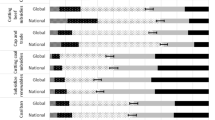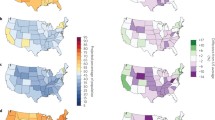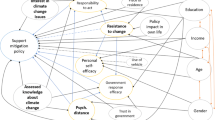Abstract
Discerning the general public’s support of climate change policies is a significant part of understanding the political and social dynamics of mitigating climate change. National level surveys are a useful tool for furthering this understanding but present multiple challenges, two of which are addressed in this paper. The first challenge is that the U.S. public’s limited knowledge of climate change issues requires that information is provided in the survey, and that the content of this information is thought to be critical in eliciting accurate responses. Second, the use of national surveys may mask regional and state differences that result from the distribution of predicted climate change impacts and varying social contexts. We explore these issues by assessing the impacts of (a) the provision of information on climate change impacts at different scales (national and regional) and (b) the respondent’s state of residence (Michigan or Virginia) on climate change policy support. We found a modest relationship between state of residence and policy support, with Michigan residents less likely to support climate change mitigation policies than residents of Virginia. The provision of information on the regional versus national level of predicted impacts of climate change did not influence climate change policy support.
Similar content being viewed by others
References
Ansuategi A (2003) Economic growth and transboundary pollution in Europe: an empirical analysis. Environ Resour Econ 26:305–328
Arrow K, Solow R, Leamer EE et al (1993) Report of the NOAA Panel on Contingent Valuation. Federal Register 58:4601–4614
Arrow K, Bolin B, Costanza R et al (1995) Economic growth, carrying capacity, and the environment. Science 268:520–521
Berk RA, Fovell RG (1999) Public perceptions of climate change: a willingness to pay assessment. Climatic Change 41:413–466
Berk RA, Schulman D (1995) Public perceptions of global warming. Climate Change 29:1–33
Berrens RP, Bohara AK, Jenkins-Smith HC et al (2004) Information and effort in contingent valuation surveys: application to global climate change using national Internet samples. J Environ Econ Manag 47:331–363
Blomquist GC, Whitehead JC (1998) Resource quality information and validity of willingness to pay in contingent valuation. Resource Energy Econ 20:179–196
Bord RJ, O’Connor RE, Fischer A (2000) In what sense does the public need to understand global climate change? Public Underst Sci 9(3):205–218
Bostrom A, Read D, Morgan MG, Smuts T (1994) What do people know about global climate change? Survey results of educated laypeople. Risk Anal 14:971–982
Brechin SR (2003) Comparative public opinion and knowledge on global climatic change and the Kyoto Protocol: the U.S. versus the world. Int J Sociol Soc Pol 23:106–134
Brechin SR, Kempton W (1994) Global environmentalism: a challenge to the post material thesis? Soc Sci Quart 75:245–269
Cash DW, Moser SC (2000) Linking global and local scales: designing dynamic assessment and management processes. Global Environ Change 10:109–120
Dear M (1992) Understanding and overcoming the NIMBY syndrome. J Am Plann Assoc 58:288–291
Dietz T, Stern PC (1995) Toward realistic models of individual choice. J Socio Econ 24:261–279
Dietz T, Ostrom E, Dolsak N, Stern PC (2001) The drama of the commons. In: Ostrom E, Dietz T, Dolsak N et al (eds) The drama of the commons. National Academy Press, Washington D.C, pp 3–35
Dietz T, Dan A, Shwom R (2007) Support for climate change policy: social psychological and social structural influences. Rur Soc 72:185–214
Dillman DA (2000) Mail and Internet surveys. Wiley, New York
Dillman DA, Christenson JA, Carpenter EH, Brooks RM (1974) Increasing mail questionnaire response: a four state comparison. Am Sociol Rev 39:744–756
Dunlap RE (1998) Lay perceptions of global risk—public views of global warming in cross-national context. Int Sociol 13:473–498
Dunlap R, Mertig A (1997) Global environmental concern: an anomaly for postmaterialism. Soc Sci Quart 78:24–29
Easterling DR (1999) Development of regional climate scenarios using a downscaling approach. Climatic Change 41:615–634
Fisher A, Abler D, Barron E, et al (2000) Preparing for a changing climate: The potential consequences of climate variability and change. A report of the Mid-Atlantic regional assessment team. Penn State University
Freudenburg WR (1991) Rural–urban differences in environmental concern: a closer look. Sociol Inq 61:167–198
Hannon B (1987) The discounting of concern. In: Pillet G, Murota T (eds) Environmental economics. Leimgruber, Geneva, pp 227–241
Henry AD (2000) Public perceptions of global warming. Hum Ecol Rev 7:25–30
Hoehn J, Randall A (1987) A satisfactory benefit cost indicator from contingent valuation. J Environ Econ Manag 14:226–247
Hoehn J, Randall A (2002) The effect of resource quality information on resource injury perceptions and contingent values. Resource Energy Econ 24:13–31
Holman IP, Rounsevell MDA, Shackley S et al (2005) A regional, multi-sectoral and integrated assessment of the impacts of climate and socio-economic change in the UK: Part I. Methodology. Climatic Change 71:9–41
Inglehart R (1995) Public support for environmental protection: objective problems and subjective values in 43 societies. Polit Sci Polit 28:57–72
Kaplowitz MD, Hadlock TD, Levine R (2004) A comparison of web and mail survey response rates. Public Opin Quart 68(1):94–101
Kempton W (1991) Public understanding of global warming. Soc Natur Resour 4:331–335
Leiserowitz A (2006) Climate change risk perception and policy preferences: the role of affect, imagery, and values. Climatic Change 77:45–72
Maddala GS (1983) Limited-dependent and qualitative variables in econometrics. Cambridge University Press, Cambridge
Mangione TW (1998) Mail surveys. In: Bickman L, Rog D (eds) Handbook of applied social research methods. Sage, Thousand Oaks, pp 399–428
McDaniels T, Axelrod LJ, Slovic P (1996) Perceived ecological risks of global change. Global Environ Chang 6:159–171
McKelvey RD, Zavoina W (1975) A statistical model for the analysis of ordinal level dependent variables. J Math Sociol 4:103–120
Miller TI, Kobayashi MM, Caldwell E et al (2002) Citizen surveys on the web. General population surveys of community opinion. Soc Sci Comput Rev 20(2):124–136
Munro A, Hanley ND (1999) Information, uncertainty, and contingent valuation. In: Bateman IJ, Willis KG (eds) Valuing environmental preferences: Theory and practice of the contingent valuation method in the US, EU, and developing countries. Oxford University Press, New York
National Assessment Synthesis Team (NAST) (2000) Climate change impacts on the United States. Cambridge University Press, Cambridge
O’Connor RE, Bord RJ, Fisher A (1999) Risk perceptions, general environmental beliefs, and willingness to address climate change. Risk Anal 19:461–471
O’Connor RE, Bord RJ, Yarnal B, Wiefek N (2002) Who wants to reduce greenhouse gas emissions? Soc Sci Quart 83:1–17
Perrings C, Hannon B (2001) An introduction to spatial discounting. J Regional Sci 41:23–38
Read D, Bostrom A, Morgan MG et al (1994) What do people know about global climate change?: Survey results of educated laypeople. Risk Anal 14:971–982
Schiermeier Q (2003) Climate panel to seize political hot potatoes. Nature 421:879
Settersten RA Jr (1999) Lives in time and place. The problems and promises in developmental science. Baywood, Amityville
Smith VK (1997) Pricing what is priceless: A status report on non-market valuation of Environmental resources. Int Yearbook Environ Resour Econ 8:156–204
Smith VK, Desvouges WH (1986) Averting behavior, does it exist? Econ Lett 20:291–296
Sousounis PJ, Bisanz JM (Eds.) (2000) Preparing for a changing climate Great Lakes: A summary by the Great Lakes Regional Assessment Group for the U.S. Global Change Research Program. US EPA
Swoboda WJ, Muhlberger N, Weitkunat R, Schneeweiß S (1997) Internet surveys by direct mailing: An innovative way of collecting data. Soc Sci Comput Rev 15(3):242–255
U.S. Bureau of the Census (2000) Tables DP-2 (Profile of selected social characteristics: 2000) and DP-3 (Profile of selected economic characteristics: 2000), Geographic Areas: Michigan and Virginia. Washington DC. http://factfinder.census.gov/
Uyeki ES, Holland LJ (2000) Diffusion of pro-environment attitudes? Am Behav Sci 43:646–662
Author information
Authors and Affiliations
Corresponding author
Rights and permissions
About this article
Cite this article
Shwom, R., Dan, A. & Dietz, T. The effects of information and state of residence on climate change policy preferences. Climatic Change 90, 343–358 (2008). https://doi.org/10.1007/s10584-008-9428-7
Received:
Accepted:
Published:
Issue Date:
DOI: https://doi.org/10.1007/s10584-008-9428-7




